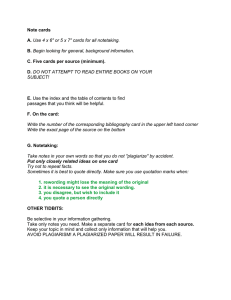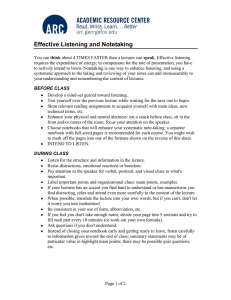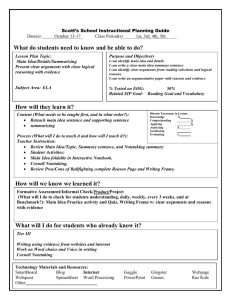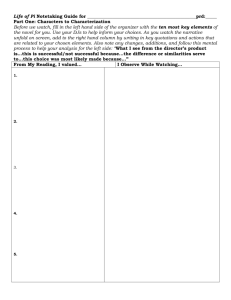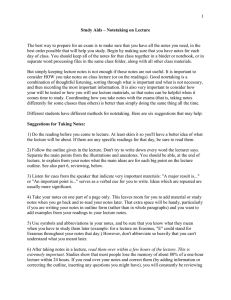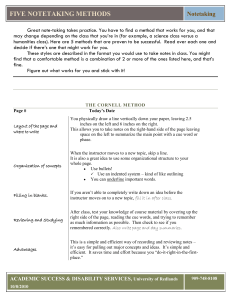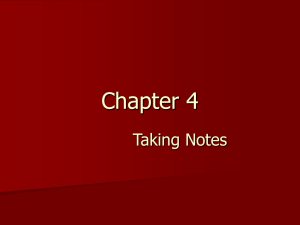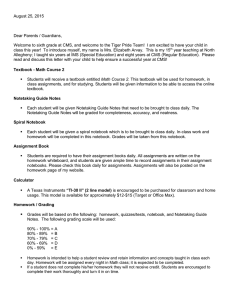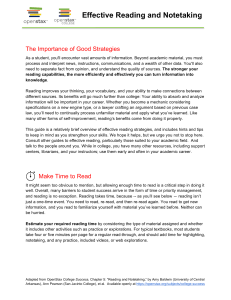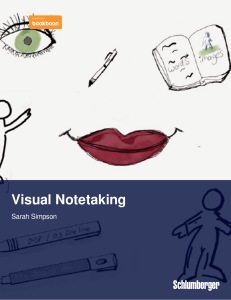HOW TO GET THE BEST OUT OF LECTURES
advertisement
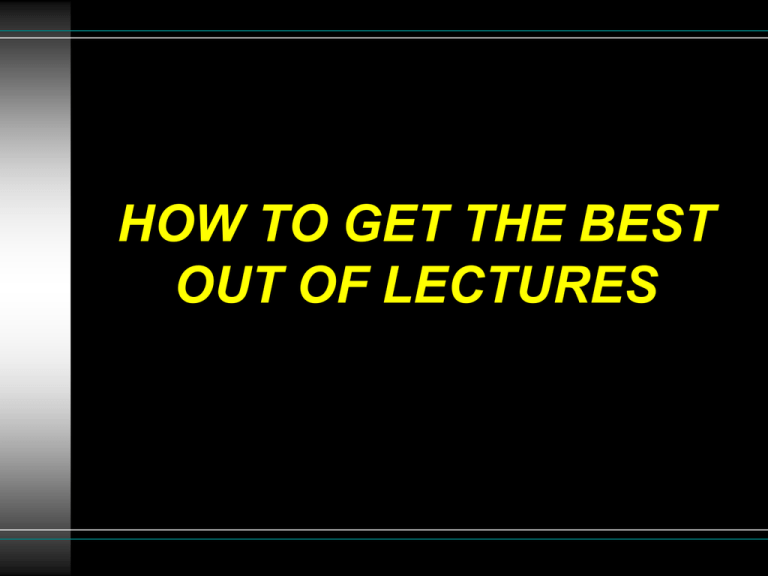
HOW TO GET THE BEST OUT OF LECTURES OBJECTIVES Activities to do before the lecture Activities to do during the Lecture Activities to do after the lecture WHAT IS LECTURE? A lecture is an oral presentation intended to present information or teach people / students about a particular subject or topic, by a university or college or professional teacher. WHAT SHOULD BE DONE Before the lecture During the Lecture After the lecture BEFORE THE LECTURE... the “Schedule for the Day” for the topics to be introduced Review any notes from the previous lecture Complete any assigned outside reading or reference assignments Check BEFORE THE LECTURE... Have notes/paper and writing utensils ready Sit where you will be able to avoid distractions Be prepared to listen and actively participate PREVIEWING THE TEXTBOOK Read chapter title Review the learning objectives Read the headings Look at the bold/italicized words Read the application stories in boxes Read the summary Look at the questions at the end of the chapter WHAT SHOULD BE DONE Before the lecture During the Lecture After the lecture DURING THE LECTURE Listening Writing Skills Skills (note - taking) LISTENING SKILLS DURING THE LECTURE... Listen attentively Write down the main ideas, context, and information Jot down examples that support the main ideas Summarize what is said in your own words During the Lecture... Use abbreviations and shorthands as often as possible Ask questions! Answer questions! Listen for what is emphasized or repeated During the Lecture... Make sure to copy down anything the teacher writes on the overhead or board Write in an organized, orderly, and concise manner Notetaking Skills “In addition to attending class, it is important to brush up on your notetaking skills to really achieve optimum success.” Kiran Misra, writer for Edinboro University Why do we have to take notes? To help you identify the main, important ideas in the lecture To help you learn and remember the material for later To have a record of information that may not be available anywhere else Why do we have to take notes? To keep track of information your teacher (the same person who makes your exams) considers important To help you complete class assignments and homework To clarify for you the purpose of the lecture The Five R’s The Keys to Good Notetaking: Record Reduce Recite Reflect Review From the Cornell Notetaking System Remember! Be PREPARED! Do NOT try to write down everything! Participate constructively! Remember! It is better to take too many notes than too few! Taking ten minutes to review after each class will save you hours of time later! WHAT SHOULD BE DONE Before the lecture During the Lecture After the lecture After the Lecture... REVIEW your notes, in order to keep your memory fresh! Underline or highlight main ideas, concepts, and information After the Lecture... Seek answers to any remaining questions Converse with your peers about new material REVIEW! Research indicates that 80% of new material can be recalled if you review notes within the first 24 hours of presentation. FORGETTING CURVE EFFECTIVE STUDY I. The key to effective study is: CONSISTENCY II. Consistency is dependent upon planning: Keep a weekly calendar Set a study time you can adhere to daily Plan to work in the same place each evening EFFECTIVE STUDY Work at a desk or table Have good lighting NO TV, iPhone, Stereo, etc Do something each evening III. P Study Plan = Preview; read the bold print, pictures, graphs, etc. EFFECTIVE STUDY Q = Question; read chapter questions, vocabulary, and teacher worksheets two or three times R = Read; read the given selections, and note familiar passages S = Study; go over chapter questions and worksheets. Review class notes T = Test yourself; don’t wait for a formal test to discover you don’t know an answer EFFECTIVE STUDY Keep a Notebook for every class: Keep them neat Update your notebook daily Use ink Place corrected papers and/or handouts in your notebook (in the back) SUMMARY Before Scheduling, preparing for class, reviewing the textbooks, objectives etc During the lecture Listening to the lecture and taking notes After the lecture the lecture Remembering the lecture, how to study more effectively. Study Hard, and make it count!

